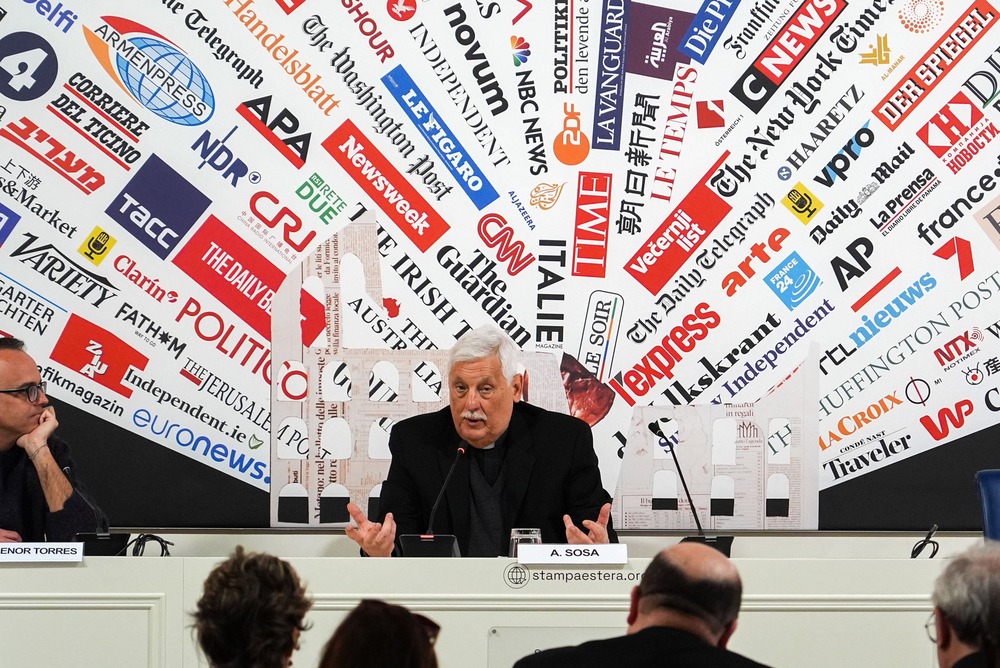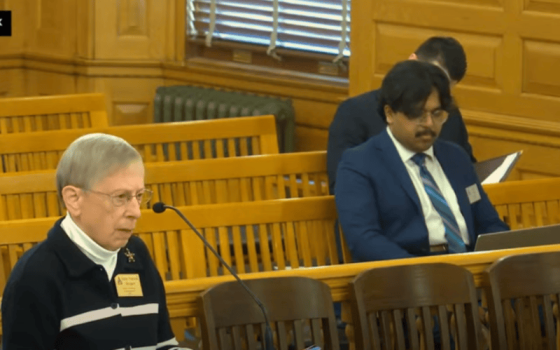
Jesuit Father Arturo Sosa, superior general of the Jesuits, speaks at a news conference in Rome April 10, 2025. (CNS/Lola Gomez)
Using forced deportations and detainment to deal with migration is "a scandal," said Jesuit Fr. Arturo Sosa, superior general of the Jesuits.
The Jesuits, the largest men's religious community in the world, are actively involved with their mission partners in accompanying migrants, refugees and asylum seekers because "this is the message of the Gospel," he told reporters April 10.
"We are not inspired by Kissinger," the former U.S. secretary of state and national security adviser who had advocated for liberal immigration policies, he said; "we are inspired by Jesus," which means "mercy" must lie at the heart of their work and policies.
The 76-year-old Venezuelan superior general held a news conference in Rome to discuss the state of the world, the church and the Jesuits and to take questions from reporters.
One reporter asked what he would say to U.S. President Donald Trump regarding his deportation of more than 230 Venezuelans to a maximum security prison in El Salvador. "What would I say? That's not the way. A president of the United States does not do that."
Just the prison itself is "a scandal," he said. "It's something that does not make sense. It is very painful" news. He also criticized the Venezuelan government and said its jailing of dissidents has become an "instrument of policy."
When asked about the impact of the Trump administration cutting off federal funding for church-based groups assisting refugees, Sosa said this has hurt the work of Jesuit Refugee Service, too, but they have launched a major fundraising campaign to drum up needed funds.
JRS operates migrant shelters, visits detained migrants, offers resettlement support and provides education and psychosocial services in refugee camps. Those educational programs, he said, were the only possibility for many refugees to obtain credentials recognized "on the outside" when they are no longer refugees.
When asked about Pope Francis' letter to the U.S. bishops supporting their Gospel mandate to support and accompany migrants, Sosa said this is just one of the many ways the Catholic Church goes "against the current."
Advertisement
But that is because "it is the message of the Gospel," not a political program, he said. It's hard to say whether leaders will accept the church's position or not, and advocating for their position "is not that easy."
"I must also say that it is not that Pope Francis is (only) against the migration policies of Trump, he is against the migration policies of many countries, including Europe's," the Jesuit priest said.
The terrible situations facing migrants, such as being turned away at borders, deported, poorly welcomed and misunderstood, did not crop up just a few months ago or in just one country, he said.
"I am in complete agreement with the pope, that it is a scandal" from the point of view of what is humane and according to the Gospel, he said.
A number of questions focused on Slovenian Fr. Marko Rupnik, a former Jesuit who was expelled from the order in 2023 for disobeying his superiors' orders to follow restrictions after several religious sisters accused him of sexual, psychological and spiritual abuse. Allegations and subsequent investigations concerning his abuses from as far back as the 1990s did not emerge until starting in 2018.
Sosa was asked how it was possible so much time elapsed from the time of the abuse to the allegations, investigations and subsequent punishments, which included a brief period in 2020 when Rupnik was excommunicated.
The Jesuit superior said it was a form of "blindness," which they have asked victim-survivors to forgive them for.
"We use this expression," he said, "because it is true that we did not see it" and did not "piece together the signs that were there," which often happens in abuse cases, not just those related to Rupnik.
There were many factors, he said, including the difficulty of making an accusation of this kind, "but certainly, I say, we were lacking more awareness (needed) to see what was happening."
While there is much work to do, he said, the Jesuits have been carrying out an order-wide "program of promoting a consistent culture of care, of safeguarding" and are particularly aware of the danger of spiritual abuse.
"All people are vulnerable" to any kind of abuse if relationships have an "imbalanced" power dynamic in which one does not recognize the other's dignity, "that we are equal, that we are people with limits" and boundaries in relationships because, "in the environment in which we work as priests or religious, it is always a great risk."
Sosa was asked to weigh in on the debate a number of shrines, institutions and dioceses are having about whether to cover up or remove artwork created by Rupnik.
He praised and recommended the process of discernment employed by Bishop Jean-Marc Micas of Tarbes and Lourdes.
While the bishop recently announced the mosaics on the large central doors of the shrine's Basilica of the Rosary would be covered, he said the move reflected a decision arrived at after "a long process of discernment with the people, the local community, the victims" and was not a diktat reflecting the bishop's own personal opinion.
"There is no one rule to take care of everything everywhere," Sosa said, because it will depend on the local context, "and on how much this is harming someone."






